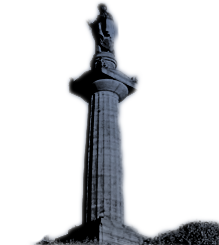William McGavin
McGAVIN, WILLIAM, was born August 12th, 1773, on the farm of Darnlaw, near Auchinleck in Ayrshire, which his father held on lease. He attended school when about seven years of age but his parents moved to Paisley in 1783, when he was sent to work. He tried silk weaving, but eventually was apprenticed to John Neilson, printer and bookseller. His duties included reading proof-sheets which led McGavin to study the English language and, despite the limited nature of his education, he was able to attract notice as an author under the age of twenty.
He left Mr Neilson’s business in 1793 and assisted his elder brother in the management of a school, where writing, arithmetic, and mathematics were taught eventually becoming the headmaster; but he ultimately abandoned teaching. In 1798 he was employed as book-keeper and clerk by David Lamb, an American cotton merchant and acted as tutor to his two sons at the same time. Some years later when Lamb returned to America, McGavin became his partner and the business was carried on in Glasgow. In 1805, McGavin married Miss Isabella Campbell of Paisley but had no children. After the death of his original patron, Lamb, he entered into partnership with one of Lamb’s sons and carried on a West India’s business under the firm of McGavin and Lamb. This ultimately proved unprofitable, and in 1822, he began work at the British Linen Company’s bank and was there until his death in 1832.
McGavin was brought up by his parents strictly in the Presbyterian faith. About 1800, dissent from the views of church government induced him to join the Rev. Ramsay in the formation of an independent or congregational church. He began to preach, receiving from Mr Ramsey the ordination which was necessary for the pastoral office. Eventually, in 1808, he joined the congregation of Mr Greville Ewing in the Nile Street meeting-house, Glasgow, where he was soon afterwards invested with the office of deacon. Here he might have also continued to preach but he was now unable from the pressure of business. He did occasionally consent to perform public worship in the neighbouring villages, or in places where he thought such ministrations necessary.
McGavin however did find time, to write a number of religious tracts and stories. The most distinguished of all McGavin’s writings was his “Protestant,” a series of papers, designed to expose the errors of the church of Rome, commenced in 1818, and finished in 1822. The celebrity acquired by this work, is a testimony to the powers of the author. In its collected form of in four volumes it went through seven editions in the first ten years. One of the most eminent bishops of the church of England offered to give him holy orders. The most gratifying to the author, was the interest which he was honoured to excite in the public mind, with regard to the subject of popery. It is matter of notoriety, that McGavin was prosecuted for certain articles in the Protestant, and had a verdict against him, imposing on him a fine of £100, which, with expenses, amounted to above £1200. £800 of the £1200, was raised by public subscription. Mr McGavin was obliged to pay the balance out of his own pocket. The publishers afterwards came forward to reimburse the author, which, from the sale of the work, they were enabled to do without loss to themselves.
McGavin, in 1827, superintended a new and improved edition of “The Scots Worthies,” a work commemorating the lives of the most eminent Scottish clergy of the sixteenth and seventeenth centuries, and originally written by an unlettered individual named John Howie, of Lochgoin. The book was greatly improved by the notes. Not long before his death, McGavin superintended a new and improved edition of Knox’s History of the Reformation; and aided with an introduction, a work by the Rev. Mr John Brown of Whitburn, entitled “Memorials of the Nonconformist Ministers of the Seventeenth Century.”
He died suddenly of apoplexy, August 23, 1832 and McGavin’s published writings are a sufficient and lasting memorial. However his work in promoting religious and worldly interests of all who came under his notice and his friendly character must be added. Two of his most conspicuous qualities were the power of a satirist and a certain precision which appeared in all he spoke or wrote. Those, who knew him only from his controversial writings, may thought of him as austere but he actually was the reverse. The profits of the ‘Protestant’ he once offered as a subscription to the society in this city for the support of the Catholic schools. The offer was declined, as it was taken the wrong way and was thought of as an insult. They say that had they known him as his friends knew him, they would have accepted it as it was offered as a mark of good-will.









